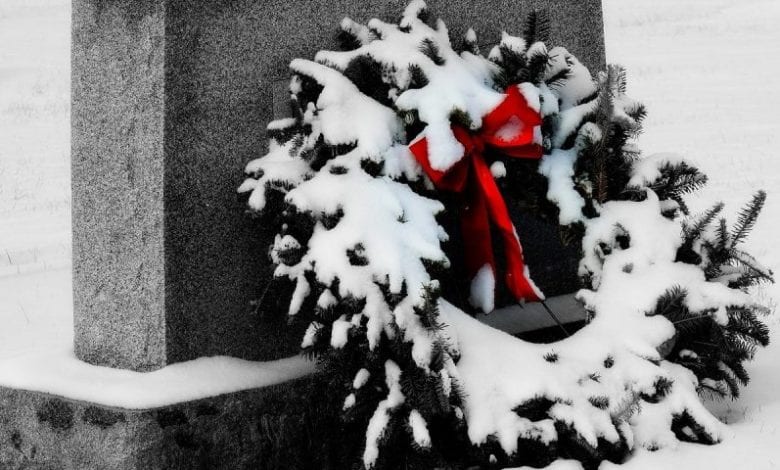Death at Christmas

It’s supposed to be one of the most joyful times of the year, the food, festivities and family coupled with the gift of another pair of novelty socks from a long lost relation. The Christmas period is usually a time of general enjoyment, even if it can turn boring by lunchtime on Boxing Day. It seems like despite the high levels of alcohol drank and food consumed, not a lot usually goes wrong, with the exception of a burnt turkey and some undercooked sausages. The trouble is usually reserved for the local pubs on Christmas eve, however while it may feel like it, the day itself is not immune from life’s darkest events. The chance of a death at Christmas means funeral directors cannot simply sit back and watch reruns of James Bonds and Carry Ons during the Christmas period like the rest of the country. The work of the funeral professional is often referred to as the ‘fourth emergency service’ at Christmas time, with most funeral directors humbly putting aside their own festivities to be on the doorstep of the deceased within the hour. While families are first expected to call 999 and ask for the ambulance, once the person is declared deceased, it is the funeral professionals led by the coroner who will investigate the cause of death and pass the body onto the undertaker while the funeral director deals with the grief and helps to plan the funeral.
“There’s many occasions where I’ve gone off to collect somebody that’s died, with a turkey leg in my hand,” says funeral director and SAIF president Paul Allcock. “Whatever effect it’s going to have on your Christmas, it’s not having half as bad of an effect on you as it is on the families that you’re dealing with.” When asked what the main difficulties are when dealing with a death around this period he explains, laughing: “There’s a few.” Allcock says the client’s mindset is “hampered” by the celebrations going on around them, while suffering a bereavement. Allcock adds it is “not uncommon” to see an increase in suicide rates around Christmas time as if people are not having the celebration that most people are this can be a “much more mentally trying time for folks”. Allcock says there are “numerous challenges” relating to “practical dealings” around this time, with “a list as long as your arm” of delays.

Challenges are presented by the double bank holiday as well as the closures of cemeteries, mortuaries and crematoria, which Allcock says creates a backlog and a period where clients don’t want to have a funeral. “People often say, ‘actually can we put it off until the new year, because we don’t really want to remember that time’,” says Allcock on the low popularity of planning funerals around Christmas. Allcock adds that due to the amount of services which are closed it is actually impossible to fully arrange a funeral during this time. Another problem lurks within the funeral directors according to Allcock, in the shape of staff illnesses. He says companies should always be prepared for the eventuality that they may end up with only two members of staff in the office. The delays caused during the Christmas period, coupled with the fact Allcock believes people tend to hold on throughout the Christmas period if they have an impending death, means that “January tends to be the busiest month of the year”.
With registrars closing, Allcock says it can also be a problem to try and achieve a death certificate within the recommended five day period saying the mountains of delays and issues are “trying” for both funeral directors and families. When asked if other sectors of the funeral profession should adapt their practices to lift some of the grief caused by them not operating during the Christmas period, Allcock says: “From a personal perspective, that would be wonderful.” He believes all funeral directors would agree with him that it would be great if other related services followed the lead of the funeral directors, using the example of a family he served who wanted to arrange a funeral in the middle of the night just as a loved one had died, he said that when asked to wait 10 days to fully plan a funeral it leaves families in limbo, where “nothing can be done, literally”. Allcock says his local council used to have a phone number many years ago which could be used by funeral directors to make a booking. The phone number is now “non-existent” and he doesn’t believe it will return as councils do not have the resources to put it back in place. If the phone service did return, Allcock says it would be “a dream come true” – but he doesn’t hold much hope.
Derek Case, managing director of Mortons Funeral Directors in Birmingham, backs up Allcock’s comments, reiterating that other supporting members of the funeral industry will take time off work during Christmas, however he says: “We’re fortunate in that we have great working relationships with those hospitals in our area.” The funeral director says he can remember one Christmas call out “as though it were yesterday”. “I recall taking the coffin of an eight year old girl into her home on Christmas eve,” he explains, “Her parents were distraught as I placed her coffin beneath the Christmas tree and they listened to her favourite Christmas Carols.” Case says the events of that evening were so poignant as “at the time, my daughter was a similar age and she’s 31 now.” He adds to Allcock’s list of potential Christmas delays by mentioning that while there hasn’t been a ‘white Christmas’ in his local area of Birmingham for a long while, “adverse weather is always a concern”. When funerals do happen close to the festive period he says he has seen problems when family members of the deceased need to fly in from abroad, “this does give rise to anxieties for some”.

For those experiencing their first Christmas as a funeral director, Allcock recommends that they “make sure that they’ve got backup for their own resources”. I the company is small with only two or three members of staff “it’s not out of the question” that they will fall ill, meaning that the company would need backup. He says this could come in the shape of another local funeral director who can help out, or other organisations which can help funeral directors in need of support. He adds the most important thing is to be prepared and ensure all bases are covered, because people don’t bear in mind that if one person gets ill, “it can catch up with other people in the office as well”. As a funeral director Allcock says “you only get one chance to get it right” so new directors must make sure “all the is are dotted and ts are crossed”. When dealing with the families of the deceased and keeping them going through this difficult time, Allcock says the most important thing is “clarity of information”, letting them know why certain things can’t be done and why. He says the funeral director can help to organise some things such as the type and location of the service, so that the whole arrangement doesn’t have to be done in January. Allcock also says it is important to make sure the family know they are not causing a disturbance by calling you during the Christmas period.
When asked if funeral directors can still enjoy Christmas, Allcock chuckles: “Oh, absolutely,” while there are “difficult times” he says funeral directors have to “shut off” at times. He insists, when the phone rings “you have to be there, but when the phone goes down, you have to be of the mindset of right, it’s Christmas, let’s go and enjoy ourselves”. Allcock says if funeral directors didn’t allow themselves to celebrate, they would “be in an early grave”. The SAIF president said that he knows many funeral directors who don’t celebrate and “shut off”, of them he says: “I think they struggle far more than those of us that do – you must know when to turn the switch.”
This feature was first published in Funeral Service Times’ December 2018 issue







